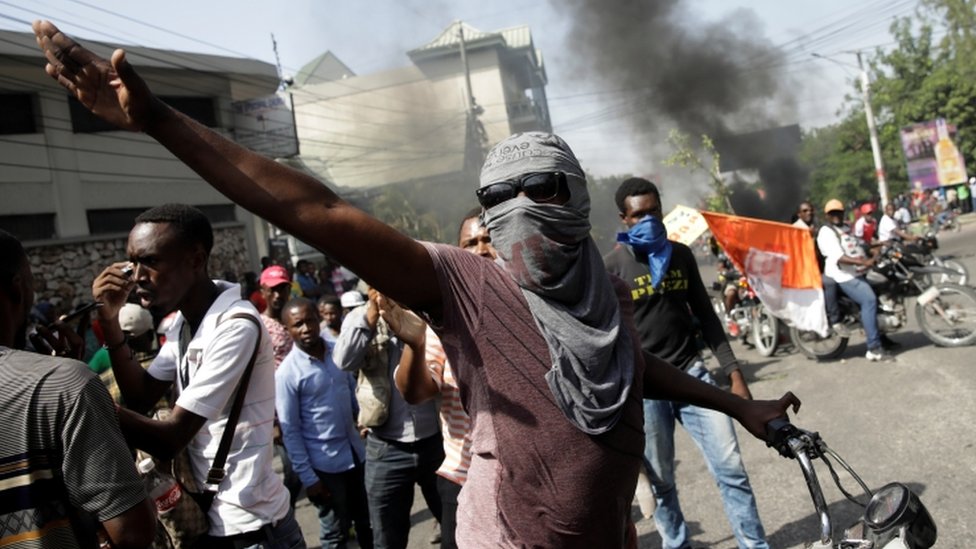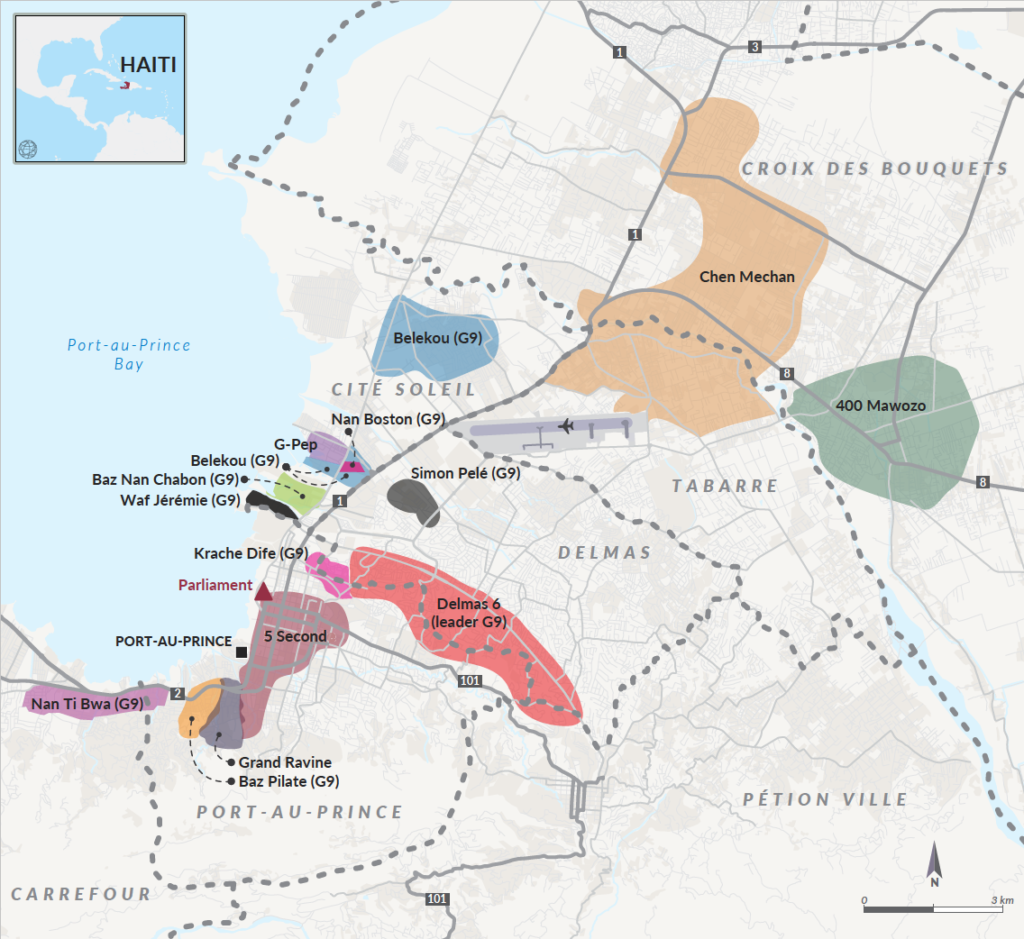NEWS
4000 prisoners escape Haiti Prisons, Is Kenya militarily and diplomatically capable of handling the mission in Haiti ?

At least 3,700 prisoners escaped from the Haiti National Penitentiary- in the capital Port-au-Prince- after fighting broke out on Saturday night. Another prison facility the Croix des Bouquets that held at least 1,450 prisoners that came under attack caved under the assault and reports still remain unclear as to how many prisoners escaped. The Reuters news agency reported that there were no signs of police officers at the prison and its main door was open.
“I’m the only one left in my cell,” one unidentified inmate told Reuters. “We were asleep when we heard the sound of bullets. The cell barriers are broken.”
In response to the situation Haitian government has now imposed a 72 hour curfew and declared a state of emergency in the country calling on all security installations to remain on high alert.
In a statement sent out on X the Haiti Police Union issued a rallying call to all police and military units in the capital to defend the facility that has come increasingly under siege. “We let bandits take the penitentiary, we are done. No one will be spared in the capital because there will be 3000 extra bandits now effective, the Police in the principal will not be able to manage anything anymore,” said the statement.
Violence erupted in several neighborhoods across the capital on Thursday when Prime Minister Ariel Henry signed an agreement with Kenyan President William Ruto for the deployment of a multinational security mission. Security agencies in the country confirmed gangs in the city targeted police stations, the international airport and the National Penitentiary. Gunshots rung in neighborhoods across the capital as gangs engaged police in street battles and residents fled their homes fearing for their lives.
Former Police Officer turned gang leader Jimmy Cherizier also known as Barbarcue issued a statement on Friday declaring his intent to oust Prime Minister Ariel Henry further him not to return to the country after his trip to Kenya. “The weapons must be turned against the real enemies who live in working-class neighborhoods, not against the small merchant anymore,” he told the AP.
What the Kenyan led mission in Haiti has to deal with?
According to a report by the Global Initiative Against Transnational Organized Crime, which is a Swedish non-profit organization, at least 200 hundred gangs control different neighborhoods in Haiti. Data from the U.N also confirms that almost half of the gangs control at least 60% of the state capital of Port-au- Prince.
At least four different gangs control territories across the capital.
The Baz Pilate – This is a gang made up of former police officers, some defectors from the special security unit with advanced weapons and tactical training.
Grand Ravine & 5 Second – Grand Ravine and 5 Second’s members come from the capital’s poorest neighborhoods. They have alleged links to Fanmi Lavalas, the political party of former Haitian President Jean-Bertrand Aristide. These two gangs control most of the motorbike and taxi ranks in the capital. Grand Ravine is led by Renel Destina, aka Ti Lapli, who is on the FBI’s Most Wanted list for allegedly kidnapping a U.S. citizen.
400 Mawozo – This is one of Haiti’s largest gangs who members are mostly foreign deportees, drug smugglers and police officers. In 2021 the syndicate made international headlines when the US Department of Justice convicted two of its leaders, Joseph Wilson and Jermaine Stephenson for the abduction of 16 US missionaries in Haiti.
Smaller gangs like the Belekou, Nan Boston and the Delmas 6 that control different neighborhoods across the capital all fall under the G9 Alliance that is controlled by Jimmy Cherizier. Although some gangs like the Chen Mechan have not declared their affiliation to the G9, almost all of them are armed with some of the latest tactical weapons available in the market, sizeable arsenals of AK-47, small firearms and crude weapons.

At least 1,100 people have died in Haiti since January this year as a result of the violence and almost 200,000 people have since been displaced.
An overview of the political landscape in Haiti.
In what seemed like a script right off the Hollywood playbook, on 7th July 2021 a group of mercenaries stormed into the Presidential residence in Haiti and assassinated then President Jovenel Moise. The United States Department of Justice charged three Haitian Americans and has since prosecuted at least 11 suspects in connection with the incident.
Prime Minister Ariel Henry soon took over as interim President but has since struggled to get a grip of the insecurity in the country, an issue that is now causing great concern for neighboring countries in the Caribbean Peninsula. Just last month police in the capital engaged large crowds of protestors who marched to Statehouse in the capital demanding Henry’s unconditional exit from office.
The Box of Tools can confirm that Prime Minister Ariel Henry had previously agreed to step down from office by the 7th of February 2024 but failed to do so citing concern over the escalating violence. On Wednesday Caribbean leaders confirmed that Henry had promised to hold general elections in Haiti no later than August 31, 2025.
In a dramatic turn of events former President Jovenel Moise’s widow, Martine Moise has been indicted alongside, ex- Prime Minister Claude Joseph and former director general of the national police in Haiti Leone Charles, in the assassination of the former president. A leaked document published in the AyiboPost, a local Haitian media outlet, detailed how the former President’s widow allegedly colluded with the former Prime Minister Claude Joseph to assassinate Moise with the intention of taking office herself.
According to the document the former President’s widow statements were found to be “so tainted by contradictions that they leave something to be desired and discredit her.” In response to the accusations the former police chief Leone Charles accused Prime minister Ariel Henry of “weaponizing the country’s judicial system to persecute opponents. Without getting in to too much of the details in context, it is at this point in time fair enough to say that Haiti is a nation in complete turmoil and in desperate need of help.
Is Kenya militarily and diplomatically prepared to handle the situation in Haiti?
The short answer in many Kenyan minds is, NO, not at all. But do the facts actually support this argument? Diplomatically speaking, what does Kenya and any other country stand to gain from taking part in the mission in Haiti?
Apart from Kenya, Benin has committed at least 2000 troops to the UN-sanctioned mission in Haiti. Chad, Bahamas, Barbados, Bangladesh have shown commitment to help quell the violence and restore order in the troubled nation. Fair enough, but lending a hand becomes a daunting task when the helping hands are plagued by dermatitis, how far you get pulled out of the hole is all dependent on your liberator’s tolerance to the pangs of their own maladies.
Almost all the countries listed above are currently contending with serious political issues amongst them, internal security. Even Jamaica and Barbados that are considered top tourist destinations worldwide have for quite some time struggled to tame dissent especially from opposing factions of public. To take on the mission in Haiti deployments from all countries involved will received advanced training in specialized weapons and tactics. The situation in Haiti has evolved into what has all the hallmarks of a hard fought urban close quarter battles of attrition no different from the battle ground in Mosul.
While it might be a lucrative point in assuring investors of the country’s ability to handle insecurity, it becomes a point of great concern to the suffrage in these countries given the manner in which political dissent is dealt with. In fact as the situation in Haiti precipitated into full blown anarchy, the main opposition leader in Chad- Yaya Dillo Djerou- was killed by government troops last week Wednesday at the opposition headquarters.
The official position of the government was that Dillo-who previously told the AFP that he feared there’d be an attempt on his life – had led an attack on one of Chad’s offices of internal security the night before he was apprehended and killed. Without delving into any other examples amongst the baunch becuase there are plenty, unleashing the level of training acquired by personnel in the Haiti mission on the public – most of whom are largely unarmed back home – could have potentially disastrous consequences. It more so threatens the very delicate fibres of democracy that are yet to find common place in African governments.
Since 2004 the United Nations has held at least three consecutive missions in Haiti, the biggest and longest of them, (Mission des Nations Unies pour la stabilasation en Haiti) the United Nations Stabilization Mission in Haiti, MINUSTAH, that spanned one and a half decades. In that time two different regimes have taken office, but the situation in the country has only deteriorated further.
Despite having made significant progress in reinstating some public institutions, locals largely criticized the MINUSTAH mission accusing officers of rape and extrajudicial killings. With some locals defecting from the specialized police units into the gangs, managing the situation has grown increasingly perilous. So the intention to stand with a fellow African nation in need is not in question, but the ability to sustainably & simultaneously handle security and humanitarian concerns of the country.
In essence all countries taking part in the mission in Haiti could possibly have signed up for a long-term military and diplomatic engagement with potentially far-reaching economic consequences. But the potential behind bilateral engagement and mutual trade partnerships with all stakeholders involved presents a unique opportunity for Kenya to revive certain sectors of the economy that have for a long time been on a slump.
From the big players like the U.S, France and Canada with a proper diplomatic strategy in play the country stands to benefit from technological advancements that could support the resuscitation of certain industries and in turn create employment.
According to UN Spokesperson Stephanie Dujarric, 10.8 million dollars has already been deposited in a trust to support the mission in Haiti and an additional 78 million has already been pledged. The United Nations says some 5.5 million people in Haiti – half the population – need humanitarian assistance and it is appealing for $674 million in 2024 to help provide humanitarian assistance.
However Haiti presents a unique set of military and diplomatic challenges that neither country that has joined the fray to help mitigate the situation has proven capable of addressing. Indeed it presents an opportunity for Kenya to proudly earn a seat at the UN Security Council, but it equally exposes our under belly especially on security and integrity, which the current administration has failed to demonstrate on multiple occasions.
Don’t rush to plough your neighbours farm as the weeds take root in yours, so goes the adage.
SOURCES: BBC, Aljazeera, Global Initiative Against Organized Crime, AP, Citizen Digital, The East African & USA today.














Leave a Reply
You must be logged in to post a comment.